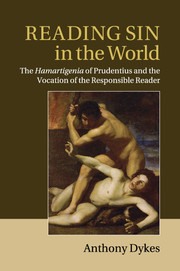Book contents
- Frontmatter
- Contents
- Acknowledgements
- Abbreviations, manuals and works of reference
- Bible texts used
- Classical texts used
- Electronic resources
- The names of biblical characters
- Vocabulary and style
- 1 Introduction: ‘Prudentius counts’
- 2 The world projects human responsibility
- 3 The vocation of the responsible reader: the biblical strategy
- 4 The vocation of the responsible reader: the genre strategy
- 5 Conclusion
- Appendix A A note on the title of the Hamartigenia
- Appendix B A brief note on the date and circulation of the Vulgate Genesis
- Bibliography
- Index
1 - Introduction: ‘Prudentius counts’
Published online by Cambridge University Press: 03 May 2011
- Frontmatter
- Contents
- Acknowledgements
- Abbreviations, manuals and works of reference
- Bible texts used
- Classical texts used
- Electronic resources
- The names of biblical characters
- Vocabulary and style
- 1 Introduction: ‘Prudentius counts’
- 2 The world projects human responsibility
- 3 The vocation of the responsible reader: the biblical strategy
- 4 The vocation of the responsible reader: the genre strategy
- 5 Conclusion
- Appendix A A note on the title of the Hamartigenia
- Appendix B A brief note on the date and circulation of the Vulgate Genesis
- Bibliography
- Index
Summary
‘Prudentius is a first class innovator in Latin poetry.’ It is time for Prudentius to return to the canon of major Latin poets. Erasmus says he would rather read one ode of Prudentius than a whole shipload of verses by Pontano. Praises for Prudentius from the great figures of the Renaissance could be multiplied, but perhaps H. W. Garrod, in his introduction to the Oxford Book of Latin Verse, is Prudentius's most surprising and effective advocate. He says not only that ‘Prudentius counts’, but that ‘The author whose exclusion I most regret is Prudentius’, and that he excludes him despite being aware of the ‘brief but brilliant Renaissance of the fourth century’. This is the same Garrod who seems to show such glee as he dismisses Juvenal, who ‘wants two qualities essential to great poetry – namely truth and humanity’; Persius, who ‘in the Prologue to his Satires, excluded himself from the company of the great poets’; and the Sermones and Epistulae of Horace (‘Horace himself would have known them to be out of place’). Garrod was not diffident in his judgements (he also excludes Ovid's Metamorphoses, but with less fanfare), and a century has passed since they were made, but it is valuable to cite them because they tell us, from an unexpected quarter, what Prudentius is worth.
- Type
- Chapter
- Information
- Reading Sin in the WorldThe Hamartigenia of Prudentius and the Vocation of the Responsible Reader, pp. 1 - 38Publisher: Cambridge University PressPrint publication year: 2011

